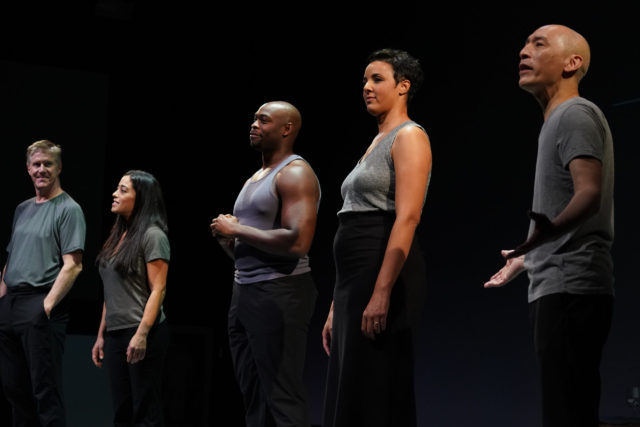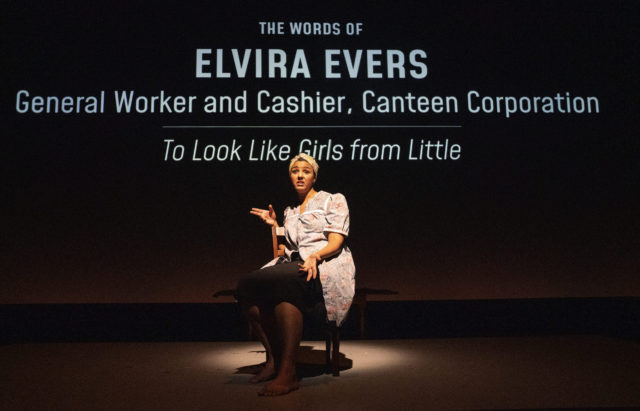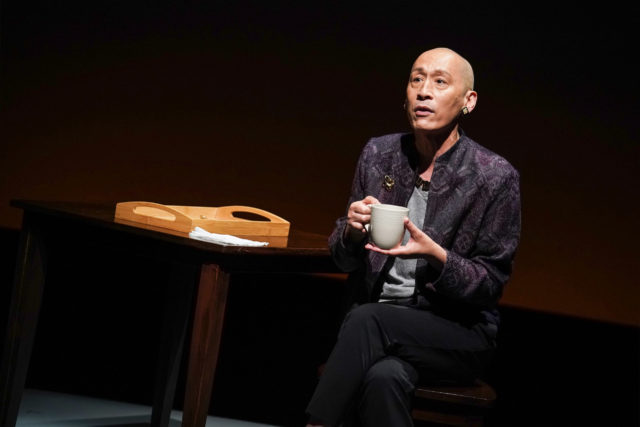
Karl Kenzler, Elena Hurst, Wesley T. Jones, Tiffany Rachelle Stewart, and Francis Jue star in reimagining of Anna Deavere Smith’s Twilight (photo by Joan Marcus)
TWILIGHT: LOS ANGELES, 1992
The Pershing Square Signature Center
The Irene Diamond Stage
480 West 42nd St. between Tenth & Eleventh Aves.
Tuesday-Sunday through November 21, $35-$70
212-244-7529
www.signaturetheatre.org
Anna Deavere Smith has brilliantly reimagined her 1993 one-woman show, Twilight: Los Angeles, 1992, for this moment in time, for a cast of five portraying more than two dozen characters, all involved in some way in the LA riots that followed the Rodney King verdict nearly thirty years ago. Originally scheduled to premiere in the spring of 2020 as part of Smith’s residency at the Signature Theatre, which began in October 2019 with a superb remount of her 1992 solo show, Fires in the Mirror, about the Crown Heights riots, Twilight has been updated and expanded to include references to the murders of Eric Garner and George Floyd and the Black Lives Matter movement.
In the nearly three decades since Deveare Smith created the work, a number of different productions have tackled it. In 2001, the play was turned into a film with Deavere Smith as part of PBS’s Great Performances series. During the pandemic, a virtual edition of the play was performed by twenty-one students at the Roxbury Latin School in Massachusetts, and a one-woman version starring Jazzma Pryor ran at Evanston’s Fleetwood-Jourdain Theatre in September. The Signature released a short Zoom preview in July with a slightly different cast that failed to capture the scope and majesty of the final product, which opened at last on the Irene Diamond Stage at the Pershing Square Signature Center on November 1.
The play is exceptionally performed by Elena Hurst, Francis Jue, Wesley T. Jones, Karl Kenzler, and Tiffany Rachelle Stewart, using verbatim dialogue accumulated by Smith from 320 interviews with subjects ranging from King’s aunt Angela, former LA police commissioner Stanley K. Sheinbaum, store owner and gunshot victim Walter Park, gang truce organizer Twilight Bey, and author and professor Elaine Kim to attorney Charles Lloyd, community activist Gina Rae aka Queen Malkah, semitruck driver and beating victim Reginald Denny, liquor store owner Jay Woong Yahng, and Congresswoman Maxine Waters. Taibi Magar directs with a captivating ferocity.

Elvira Evers (Tiffany Rachelle Stewart) is one of dozens of characters who share their thoughts about the Rodney King riots in Smith play (photo by Joan Marcus)
LAPD officer Ted Briseno, one of four cops accused of beating Rodney King, laments that his children might not look up to him as a hero anymore. An anonymous juror in the King trial says that members of the jury have received letters from the KKK asking them to join after they acquitted the officers. Real estate agent Elaine Young talks about how she was safe and sound in Beverly Hills and explains how she “was such a victim” because of all her cosmetic facial surgeries.
Sgt. Charles Duke of the LAPD’s special weapons and tactics unit, testifying for the defense, supports the use of control holds, or chokeholds, despite evidence that it kills suspects, primarily Black men. Discussing his own run-in with bigoted policemen, sculptor and painter Rudy Salas Sr. says, “I grew up with the idea that whites, are . . . Physically . . . I still got that, see that’s a prejudice that whites are physically . . . inferior, physically afraid of minorities. People of color, Blacks, and Mexicans. It’s a physical thing,
It’s a mental, mental thing that they’re physically afraid. But you see I still have that prejudice against whites. (But.) I’m not a racist!”
Reginald Denny co-assailant Keith Watson declares, “You got to realize the not guilty verdicts was heavy on everybody’s mind. I followed the trial cause I wanted to see if justice works and on that particular day justice didn’t work.” Free the LA Four Plus defense committee chairperson Paul Parker exclaims, “Basically, it’s that you as Black people ain’t takin’ this shit no more. Even back in slavery. ’Cause I saw Roots when I was young. My dad made sure. He sat us down in front of that TV when Roots came on, so it’s embedded in me since then. And just to see that, eh, eh! This is for Kunta! This is for Kizzy! This is for Chicken George! Now we got some weapons, we got our pride, we holdin’ our heads up and our chest out. We like, yeah, brother, we did this!” Former LA Times journalist Hector Tobar returns for a 2021 interview that places the events of 1992 in a contemporary context.
The actors perform on a central platform, occasionally using a chair or table. They change clothing quickly, either in the wings or right onstage. At one point, dozens of costumes are dumped on the floor, evoking the disarray during the riots. Often, as one monologue is finishing, the actor for the next segment walks up to the platform in silhouette. (The effective set is by Riccardo Hernández, with costumes by Linda Cho, lighting by Alan C. Edwards, sound by Darron L West, and projections by David Bengali.)
Each character is identified by accompanying text, along with the title of that segment; for example, “The words of Elaine Brown, former chairwoman of the Black Panther Party, ‘Bad’” and “The words of Daryl Gates, former chief of Los Angeles Police Department, ‘It’s awful hard to break away.’” Archival video footage of the riots, including the beatings of King and Denny, are shown on a pair of video monitors at the right and left as well as the back screen, immersing the audience in the horrific events of 1992–93, which look all too familiar in 2021.

Francis Jue is one of five actors portraying multiple characters in Twilight: Los Angeles, 1992 at the Signature (photo by Joan Marcus)
I was deeply moved by Deavere Smith’s solo Broadway version, which ran at the Cort Theatre in 1994, but this new Signature iteration blew me away. Running more than two hours with an intermission, Twilight flies by at a relentless, furious pace, a nonstop parade of individuals directly and indirectly discussing systemic racism, police brutality, anti-Asian hate, classism, journalistic biases, government indifference, and looting. “Oh yes, I am angry! It is all right to be angry!” Congresswoman Maxine Waters proclaims. “The fact of the matter is, whether we like it or not, riot is the voice of the unheard,” echoing what Waters and others have said about the rash of Black men killed by white police officers this century.
In a program note, Deavere Smith explains that the play is very much about gathering, about diverse people coming to the table despite their differences, ready to talk — and to listen. In the play’s most theatrical and involving scene, “A Dinner Party That Never Happened,” Brown, Parker, Rev. Tom Choi of the Westwood Presbyterian Church, Asian American man Jin Ho Lee, Chez Panisse chef Alice Waters, and former New Jersey senator Bill Bradley sit down at a table, eating and drinking while appearing to speak to one another. (At the performance I attended, one of the actors accidentally knocked over a glass of wine, and as several other cast members wiped it up, staying in character, it made me think of a ritual spilling of wine, an apt metaphor for what was happening onstage.)
Two-time Tony nominee and Pulitzer finalist Deavere Smith (House Arrest, Let Me Down Easy) and Obie winner Magar (Blue Ridge, Is God Is) have woven together a pseudo-conversation from the individual transcripts, in which the participants discuss responsibility, roots, justice, Saddam Hussein, commitment, and community. “I’m saying that these are the long haul,” Brown explains. “We just be thrown back and we will be twenty more years trying to figure out what happened to Martin, Malcolm, and the Black Panther Party.” It’s now nearly thirty years later and, sadly, as Twilight reveals, we are still trying to figure that out.